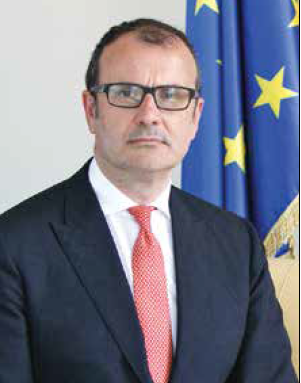Ensuring more effective coordination of the child protection system should be prioritised and further efforts made to ensure uniform implementation of policy.

EU and UNICEF rely on the UN Convention on the Rights of the Child (CRC) as the main guiding framework at advancing child rights. EU and UNICEF work on strengthening the cooperation among various sectors dealing with children – in healthcare, education and social protection, but also in the areas of justice and law enforcement to prevent violence against children.
How do UNICEF and the European Union partner in supporting the work of state authorities in Serbia in realising children’s rights?
-
EU and UNICEF are long term partners worldwide to ensure that all children enjoy their right to education, nutrition, safe water, sanitation and health. It is also essential that children are protected from discrimination, exploitation, violence and abuse. Together with UNICED, the EU is engaged to support Serbia’s efforts in promoting and protecting the rights of children and ensuring they can enjoy equal opportunities to develop their full potential. Our programmes are aimed at supporting excluded and vulnerable children from the beginning of their life, and throughout their childhood and adolescence.
Which principles do you promote through this cooperation, and how do they fit into Serbia’s European integration process?
-
The EU commitment to safeguarding and advancing child rights is articulated through a number of strategic documents and Council’s Conclusions. In April this year the EU adopted a set of conclusions on a comprehensive promotion and protection of the rights of the child, which also become an integral part of EU’s external human rights policy. The conclusions focus on promoting gender equality, ensuring the empowerment of girls, mainstreaming the rights of the child in all sectors and in all programming, and encouraging partner Countries to adopt a national strategy on the rights of the child. Child protection has an important place in Chapter 23 negotiations, which includes fundamental rights, as well as Chapter 19 concerning social policy and social inclusion.
How do these principles and objectives fit into the context of achieving Sustainable Development Goals as defined in the UN 2030 Agenda, which also indirectly or directly relate to children?
-
Children and youth are key components of the 2030 Agenda to achieve Sustainable Development Goals. UNICEF and the EU support the work of national authorities in promoting children’s rights as part of their reform process to align national laws and policies to EU standards and the 2030 Agenda. Since 2011, UNICEF and the EU have been working together with countries that are in the process of joining the EU to protect children from violence.
How satisfied are you with the results achieved in Serbia so far?
— Should violence occur an adequate response needs to be implemented through a cross-sectoral cooperation in a timely and efficient manner. In Serbia we are helping to strengthen the capacity of centres for social work, health care institutions and schools to improve their work on preventing and reporting cases of violence, and their ability to adequately respond to it. However, a new national strategy for the prevention of and protection of children from violence still need to be developed. The capacities of the Council for Child Rights should be further strengthened and new National Plan of Action for Children should be adopted.